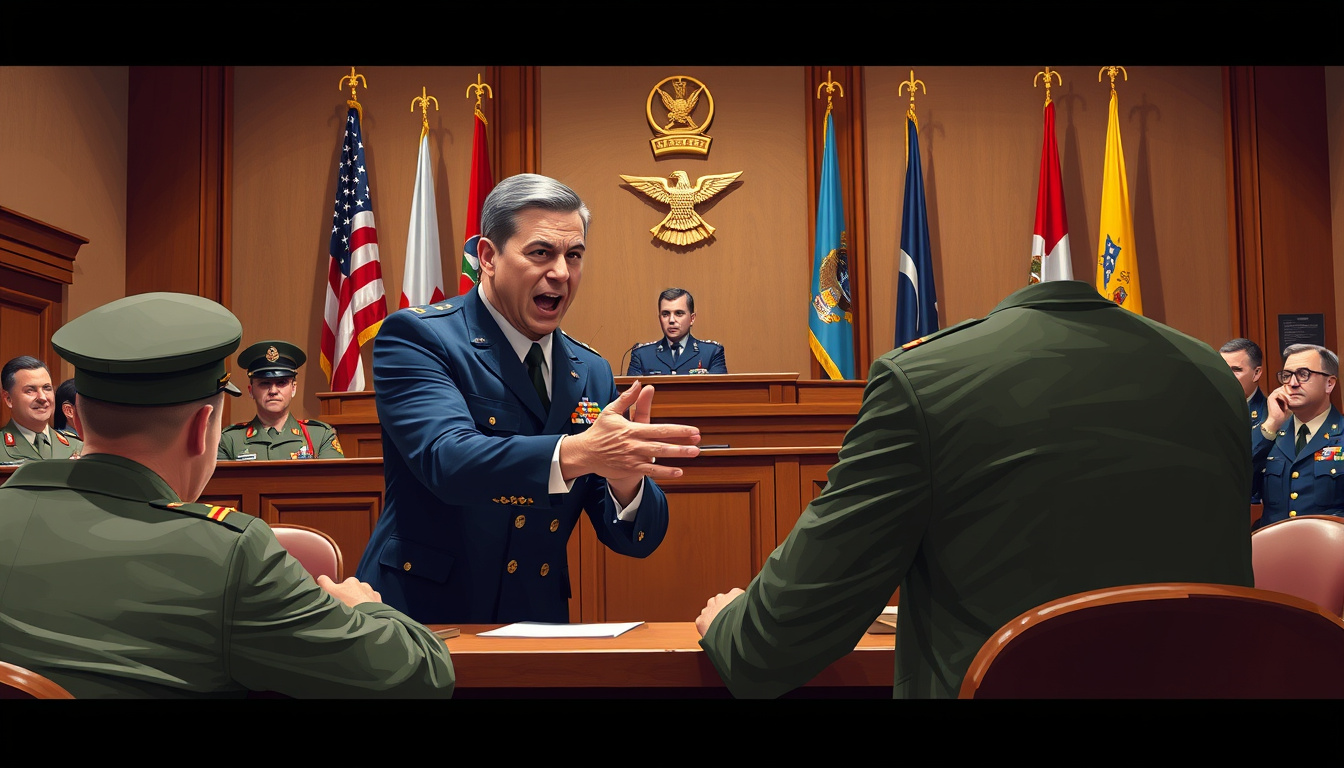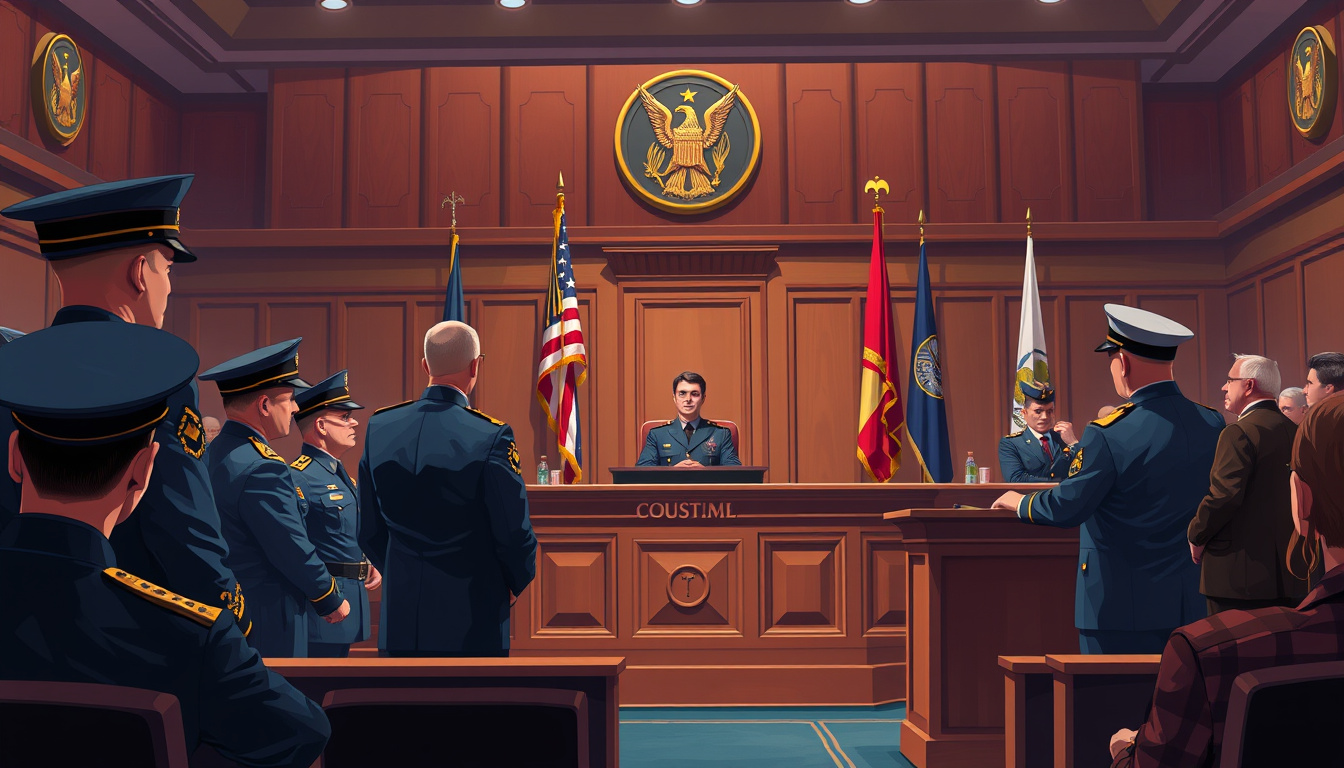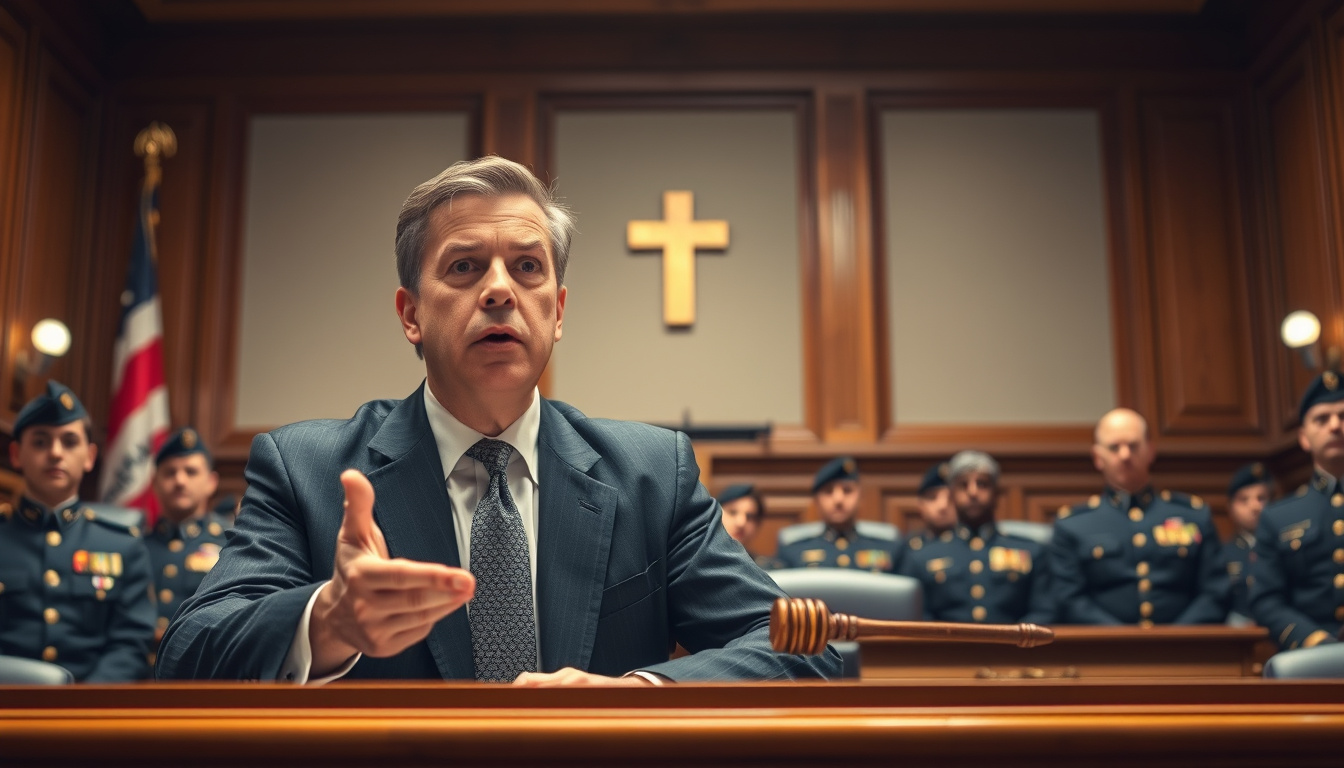Facing a court martial can be one of the most daunting experiences for military servicemembers and their families.
Whether it’s for a minor infraction or a serious accusation, the stakes are incredibly high.
If you’re navigating allegations under the Uniform Code of Military Justice (UCMJ) or confronting potential administrative discipline or separation, it’s essential to understand the court martial process.
In this article, we will provide crucial information about court martial proceedings, the vital role of a court martial attorney, the types of cases you may encounter, your legal rights, strategies for an effective defense, and the significance of having experienced legal representation by your side in these challenging times.

Key Takeaways
- Court martial proceedings are distinct legal processes specific to military personnel.
- A court martial attorney plays a crucial role in defending service members against military charges.
- Types of court martial cases vary in severity and can significantly impact a service member’s career.
- Service members have legal rights during court martial proceedings that must be upheld.
- Effective legal representation is essential for navigating the complexities of court martial cases.
Introduction to Court Martial Proceedings
When military servicemembers face serious allegations, whether they stem from criminal activity or administrative misconduct, it is imperative to understand the implications of court martial proceedings.
This complex legal process can have profound consequences on a servicemember’s career, reputation, and future.
Within the military justice system, a court martial is the mechanism used to adjudicate serious offenses under the Uniform Code of Military Justice (UCMJ), and having a skilled court martial attorney is essential in navigating these challenges.
This article aims to provide military personnel and their families with a detailed overview of what to expect during court martial proceedings, the roles of a court martial attorney, and the options available to protect one’s rights.
Role of a Court Martial Attorney
When facing the serious repercussions of military legal proceedings, having a qualified court martial attorney can make all the difference.
A court martial attorney plays a crucial role in protecting the rights of servicemembers who are accused of violations under the Uniform Code of Military Justice (UCMJ).
From the onset of the case, they provide guidance on navigating the complex military legal system, advising clients on their rights, and the potential consequences of the charges they face.
Their expertise is not confined to just courtroom representation; a skilled court martial attorney will assist in case investigations, gather evidence, consult with expert witnesses, and formulate a robust defense strategy tailored to the specifics of the case.
Additionally, they can negotiate plea deals or lesser charges, should that be in the best interest of their client.
Understanding the intricacies of military law, including procedural rules and potential defenses, ensures that servicemembers receive fair treatment and have every opportunity to challenge, resist, or mitigate the allegations against them.
‘Injustice anywhere is a threat to justice everywhere.’ – Martin Luther King Jr.

Types of Court Martial Cases
When facing a court martial, understanding the different types of court martial cases is crucial for servicemembers and their families.
There are three primary types of court martial: summary court martial, special court martial, and general court martial.
Each type handles varying degrees of offenses, and having a knowledgeable court martial attorney can make all the difference in the outcome.
1.
Summary Court Martial: This is the least serious type and is typically convened for minor offenses.
It involves a single officer serving as judge and jury, and is designed for quick resolution.
However, the penalties can still include confinement, reduction in rank, and fines.
A court martial attorney specializing in summary cases can guide servicemembers through the limited rights they have during these proceedings.
2.
Special Court Martial: This type is comparable to a civilian misdemeanor court.
It involves a military judge and at least three members (jurors) who consider more serious allegations.
Offenses that could lead to a special court martial include drug use, insubordination, and some types of theft or misconduct.
The consequences can be significant, ranging from confinement to a dishonorable discharge.
A skilled court martial attorney is essential in developing a strong defense strategy to mitigate the risks associated with such charges.
3.
General Court Martial: This is the most serious of the three and is akin to a civilian felony court.
It is reserved for severe offenses such as murder, sexual assault, or other major crimes.
Proceedings involve a military judge and at least five court members.
The repercussions are severe, including lengthy prison sentences and the possibility of a dishonorable discharge.
Here, the expertise of a seasoned court martial attorney is invaluable.
They can provide the necessary defense and representation, ensuring that the servicemember’s rights are upheld during the intricate and often intimidating process of a general court martial.
Overall, understanding the types of court martial cases and having a competent court martial attorney by your side is essential for achieving the best possible outcome during these challenging times.
Legal Rights of Service Members During Court Martial
When military servicemembers face court martial proceedings, it’s crucial that they understand their legal rights and the role of a court martial attorney.
A court martial is a judicial court for trying members of the armed services accused of offenses against military law, particularly under the Uniform Code of Military Justice (UCMJ).
The stakes in these proceedings are high, as the outcomes can lead to significant penalties, including confinement, dishonorable discharge, or other severe consequences that can affect a servicemember’s career and personal life.
Here are some essential rights that service members have during the court martial process:
1.
Right to Legal Representation: Every servicemember has the right to legal counsel during court martial proceedings.
This can include the option of a court martial attorney at no expense if the accused cannot afford to hire one.
Having an experienced court martial attorney can be invaluable as they provide guidance, strategic defense, and advocate for the servicemember’s rights throughout the legal process.
2.
Presumption of Innocence: In the court martial process, a servicemember is presumed innocent until proven guilty.
This fundamental right aligns with the legal principle that it is the prosecution’s burden to provide evidence that establishes guilt beyond a reasonable doubt.
A qualified court martial attorney will leverage this principle to build a robust defense, challenging the prosecution’s claims and evidence.
3.
Right to a Fair Trial: Service members are entitled to a fair trial conducted in an unbiased environment.
Any evidence or testimony that shows bias on the part of the court, jury, or those involved in the trial process can lead to appeals or mistrials.
A skilled court martial attorney can identify and advocate for the protection of this right, ensuring that any conflicts of interest are addressed.
4.
Right to Present a Defense: During the court martial, those accused have the right to present evidence and witnesses in their defense.
This is a critical aspect of the trial process, and the representation of a court martial attorney can prove essential in crafting a persuasive defense strategy that effectively counters the prosecution’s arguments.
5.
Right to Challenge Evidence: Accused servicemembers have the right to challenge the admissibility of evidence presented against them.
This is where a court martial attorney’s expertise comes into play, as they can file motions to suppress evidence that obtained illegally or that violates the servicemember’s rights, thereby potentially impacting the prosecution’s case.
6.
Right to Appeal: If a servicemember is convicted, they have the right to appeal the decision.
The appeal must be based on legal grounds, such as improper procedures or ineffective assistance of counsel, and can lead to a reversal of a conviction or a new trial.
An experienced court martial attorney will understand the appeals process and help navigate this complex area of law.
In conclusion, understanding the legal rights of servicemembers during court martial is crucial for those facing allegations.
Navigating the complexities of military law can be overwhelming, but securing the assistance of a dedicated court martial attorney can significantly impact the defense’s success.
They are not just legal representatives but defenders of the rights and futures of servicemembers, ensuring that justice is served fairly and thoroughly.

Defending Against Court Martial Charges
Facing court martial charges can be one of the most challenging experiences for military servicemembers and their families.
It is crucial to understand the nature of court martial proceedings and the importance of hiring a skilled court martial attorney.
These legal professionals specialize in military law, particularly the Uniform Code of Military Justice (UCMJ), and are equipped to navigate the complexities of military legal systems.
When charged with a serious offense, having a knowledgeable court martial attorney by your side can significantly impact the outcome of your case.
They can provide strategic legal guidance, help formulate a defense, and represent you effectively throughout the process.
Additionally, your attorney will ensure that your rights are protected and that you receive a fair trial, as military prosecution can be rigorous and unforgiving.
Whether you are facing allegations of misconduct, drug offenses, or any other disciplinary actions, an experienced court martial attorney can make a crucial difference in striving for a favorable resolution.
Importance of Legal Representation
When facing a court martial, securing the services of a qualified court martial attorney is not just advisable; it is crucial for your defense.
Military law is complex and distinct from civilian law, and the implications of a court martial can be severe.
A competent court martial attorney brings an understanding of the Uniform Code of Military Justice (UCMJ) and has experience navigating the military justice system.
This legal representative advocates for your rights and interests, helping to ensure that you receive a fair trial and a thorough defense.
Furthermore, an attorney specialized in military law can help you understand the charges against you, the potential penalties, and the possible defenses you might pursue.
This knowledge is empowering for military servicemembers and their families who may feel overwhelmed by the judicial process.
Engaging a court martial attorney early in the process can make all the difference, as they serve not only as your advocate in court but also as a guide for you and your family through this difficult time.
With their expertise, you can better understand your situation, prepare your case effectively, and navigate the complexities of your military rights under the UCMJ.

Conclusion: Navigating the Court Martial Process
Navigating the court martial process can be an intimidating experience for military servicemembers and their families.
It is crucial to have a knowledgeable court martial attorney who understands the complexities of military law and the Uniform Code of Military Justice (UCMJ) to ensure that your rights are protected and you receive a fair hearing.
Throughout this journey, consider seeking the support of experienced legal counsel who specializes in court martial cases.
They can provide invaluable guidance on the legal proceedings, potential outcomes, and your best defenses.
Remember, being proactive in your defense can make a significant difference in the results of your case, so do not hesitate to reach out for help early in the process.
With the right court martial attorney on your side, you can approach your situation with confidence and clarity, knowing that you are taking the necessary steps to achieve the best possible outcome.
Frequently Asked Questions
What is a court martial attorney?
A court martial attorney is a legal professional who specializes in representing military personnel during court martial proceedings, helping them navigate the complexities of military law and ensure their rights are protected.
What types of cases can a court martial attorney handle?
Court martial attorneys can handle various types of cases including non-judicial punishment, summary court martial, special court martial, and general court martial, which cover a wide range of offenses such as misconduct, service violations, and crimes under military law.
What legal rights do service members have during a court martial?
Service members have several legal rights during court martial proceedings, including the right to legal representation, the right to remain silent, the right to confront witnesses, and the right to present evidence in their defense.
Why is legal representation important in court martial cases?
Legal representation is crucial in court martial cases because it helps ensure that the accused receives a fair trial, understands their rights, and effectively presents their defense against the charges, which can have significant consequences on their career and freedom.
How can I find a qualified court martial attorney?
To find a qualified court martial attorney, you can seek referrals from military support organizations, legal aid offices, or search online for attorneys specializing in military law.
It is important to choose someone with experience in court martial defense.
If you or a loved one is under investigation or facing charges under the UCMJ, don’t wait to protect your future. Contact Gonzalez & Waddington, Attorneys at Law. Our battle-tested military defense lawyers have successfully defended service members worldwide against the most serious military offenses. Call us today for a confidential consultation and put our elite military defense attorneys in your corner.



